There was a lot of activity in the village of Britannia, West Coast Berbice on Saturday afternoon, with some rice farmers returning home on their tractors and other persons tending to their livestock.
A group of men were imbibing alcohol under a big mango tree, other people were relaxing at home or doing chores, some youths were chatting with friends on the roadside and still others were running errands.
Sherry Samaroo sat on the street leaning against the trunk of an old coconut tree as she tended to her sheep which were grazing on an open plot. She ensures that the animals do not enter the rice fields nearby. Her three nephews were playing on the street while they kept her company. Her mother, Rose Samaroo was returning home from another part of the village where she had taken her sheep to graze.

Shelly Torrington was rocking her baby in a hammock as her older child played in the yard. She had moved from Tempie Village to live at her grandmother’s house.
A farming community with a population of about 200, Britannia is bounded by the villages of Chester to the west and Tempie to the east. Most of the residents are into rice and livestock farming while some are teachers, clerks and religious leaders. They were proud that the current Ambassador to Kuwait, Odeen Ishmael, originates from the village.
Britannia is the Latin name for Britain and was once a cotton plantation. The village also operated its own well, built by the British, where residents accessed water. The well was abandoned some time around the 1920s when government started to provide the service.
The village has a ground which used to be the main attraction in the community with regular cricket matches being held. The ground also helped to prevent the youths from being involved in illicit activities, but it is now in an appalling state. Residents are calling for it to be upgraded and said during the rainy weather it cannot be accessed. Besides, they said, the street leading to the ground is in a terrible condition and is almost impassable.

Aslim Ishmael said his two children would plough through the muddy street barefoot, and would then wash their feet at a dry part of the road before putting on their footwear for school. He had spoken to the former Regional Chairman two years ago about fixing the street and was told they had to wait on the budget. He had met the current chairman on two occasions and had requested that they send an excavator, even offering to supply the diesel and provide his tractor to do the job. The Chairman, he said, promised to call him but has not done so as yet.
Ishmael, who is engaged in large-scale poultry farming, supplies eggs to shops and supermarkets. He also works as a semi-mechanical planting contractor with GuySuCo’s estate at Blairmont. He also once cultivated rice but found that venture to be demanding. He stopped a few years ago after becoming a single father, so he can dedicate his attention to his children. A former teacher at Bush Lot Secondary who taught geography, history and social studies, he assists them with their homework.
Residents would seek treatment for minor ailments at the health centre in the village or would visit the hospitals at Fort Wellington or at Mahaicony.
The village also accommodates the office for the Seafield/Tempie Neighbourhood Democratic Council (NDC) a mosque, a grocery, a machinery and farming equipment trade and a vulcanizing shop that has been in operation for several years.
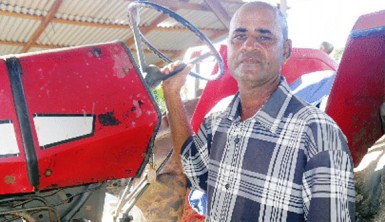
Rice farming
Some farmers have invested in rice cultivation close to the residential areas and the pastures but the livestock owners are not too pleased. They said the animals can destroy the crops and this can result in conflicts.
Other residents complained too: “When the rice farmers take in water, it would cause the residents who live close to suffer flooding. Some persons can afford gas stoves but others depend on firesides and it is hard for them to cook in the floodwater.”
Residents said that although the area is accessed from a deplorable street located opposite the NDC, it is not being fixed. “Lots of children have to use the street to go to school and during heavy rainfall they have a hard time…” A wooden bar has been erected to prevent heavy duty vehicles from entering and damaging the street but “some vehicle owners would remove it sometimes and still pass.” Some residents on one side of the public road want government to either “dig a drain or install a pipe leading to the middle-walk.”
Mohamed Baksh, a rice and livestock farmer said, “Whenever the rain falls there is nowhere for the water to go and it would flood my yards and I would lose produce from the kitchen garden. Some of my sheep also catch cold and died.”
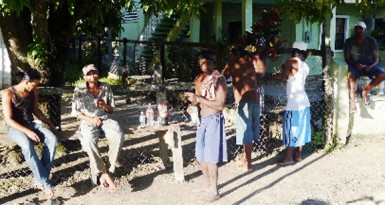
With regard to the rice industry, Baksh said it was “very hard now. Fuel and other production cost are going up and the price for paddy is going down.”
“During the harvesting period the truck and combine owners would increase their price by $100 more per bag. So by the time you take out your expense you left with very little; you would barely get something to eat.” He said the industry can be revived “and the farmers can make something if government drops the price for fuel and fertilizer.
Last crop I made $4,000 per bag [of paddy] but this year I only got $3,700.” Besides, he said the “dams are in very bad condition to transport the fertilizer…” This was blamed on the rain and poor maintenance.
His mother, Halima Baksh, 79, was in her veranda a few buildings away, looking out. A pleasant woman, she chatted about her days growing up in the village.
She related that her parents were poor farmers who reared cattle and planted two acres of rice to take care of their eight children. It was a struggle to get by in those days and
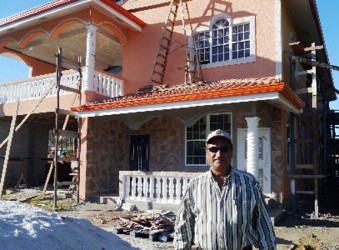
everyone lived in small houses. When she got married, her husband who was from the same village also reared cattle and cultivated two acres of rice land. She supplemented their income by making coconut oil and copra and planted a kitchen garden.
Recalling that “I worked hard,” Halima said all she does now is cooking and other household chores as her arthritis pain prevents her from doing too much. She would also attend her Friday prayers at the village mosque.
Businessman, Oudit Narine Singh has recently moved to the village where he is constructing a huge house with modern facilities. He can hardly wait for the completion of the house in about two weeks as the one he is renting is not so convenient. He is developing the machinery and farming equipment trade and is also looking at reinvesting in the rice industry.
The village is nice and the people friendly but Singh finds the conduct of some of the youths to be unbecoming. They have no regard for anyone or their own lives. He described how a young boy said to him one day, “This is my life and this is my wife. He was showing me a cigarette.” It seems as though the children were not taught any better. He said he was shocked that “this was a young kid; no serious commitment to a job, no serious commitment to school or to anything but the cigarette.” This type of behaviour, he believed, leads the youths to get into stealing.

Another prominent resident is Javed Ishmael who has been serving as the Imam of the mosque for the
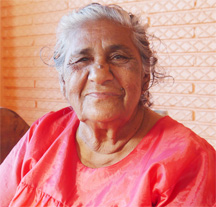
past 13 years. He is also actively involved as leader of the Guyana Islamic Trust in the West Berbice district and as a social worker. A former student of the Bush Lot Secondary, the Guyana School of Agriculture and the Guyana Islamic Institute, he is currently pursuing studies in social work at the University of Guyana, Tain Campus. He is also actively involved in the West Berbice Sheep & Goat Association and has been a livestock farmer for a number of years.
According to him, the village has seen development over the years in terms of light, water and telephone services. With regard to drainage, however, he said that although the drains appear to be clean they are not deep enough to take off the water during heavy rainfall. This would result in flooding.
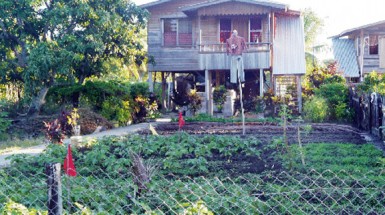

He too expressed concern about the tension that rice farming in the residential area was causing.
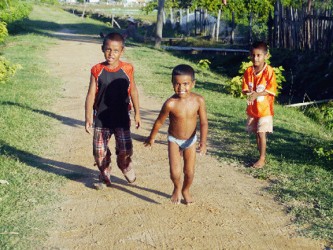
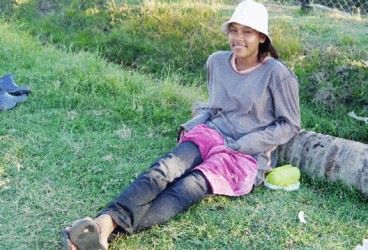
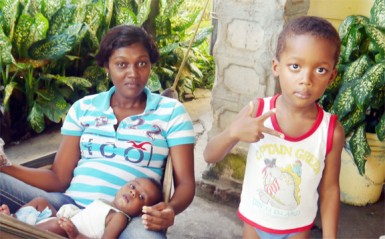
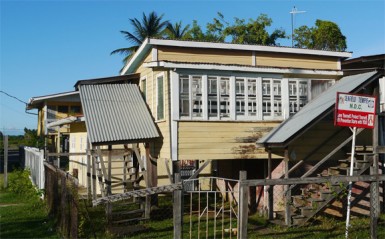
Democratic Council office









